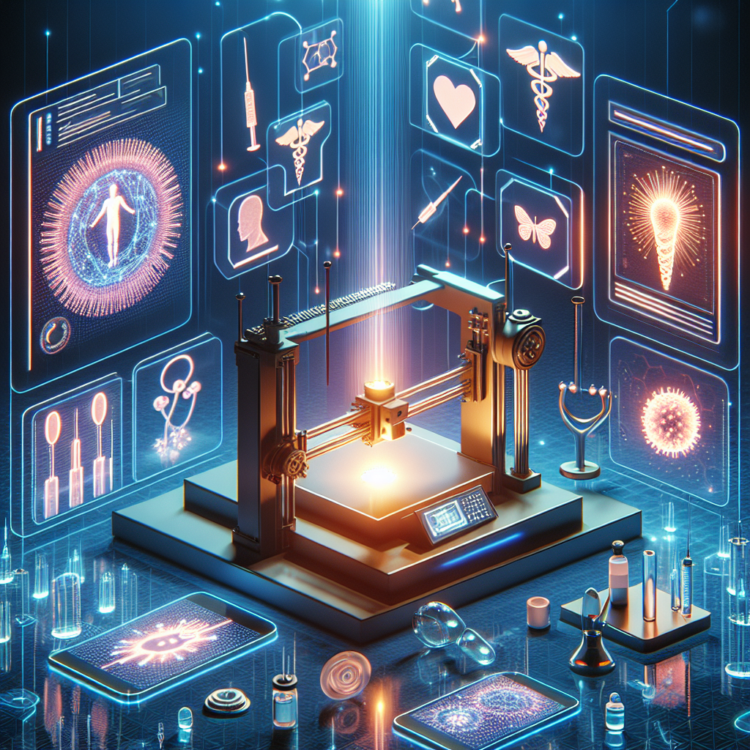Los Angeles, California – August 6, 2024 – In a significant leap forward for healthcare equity and accessibility, researchers at the University of Victoria and the Terasaki Institute for Biomedical Innovation (TIBI) have developed a revolutionary system that combines remote health monitoring and drug delivery using 3D-printed hollow microneedles. This innovative approach, detailed in a recent study published in Advanced Healthcare Materials, promises to transform healthcare delivery, particularly for those in underserved or remote regions.
Los Angeles, California – August 6, 2024 – In a significant leap forward for healthcare equity and accessibility, researchers at the University of Victoria and the Terasaki Institute for Biomedical Innovation (TIBI) have developed a revolutionary system that combines remote health monitoring and drug delivery using 3D-printed hollow microneedles. This innovative approach, detailed in a recent study published in Advanced Healthcare Materials, promises to transform healthcare delivery, particularly for those in underserved or remote regions.
The integrated theranostic microneedle array (MNA) system significantly advances personalized medicine. These 3D-printed hollow microneedles provide painless and minimally invasive access to interstitial fluid, revolutionizing drug delivery and diagnostics.
It features an array of colorimetric sensors that quantitatively measure key health indicators such as pH, glucose, and lactate levels. Simultaneously, the system incorporates a remotely-triggered mechanism for on-demand drug delivery.
One of the most notable features of this technology is its use of an ultrasonic atomizer, which streamlines the drug delivery process. This innovation enables rapid, pumpless, and point-of-care drug administration, significantly enhancing the system’s portability and reducing complexity.
The system’s capabilities are impressive, with a demonstrated ability to detect pH levels ranging from 3 to 8, glucose concentrations up to 16 mm, and lactate levels up to 1.6 mm. These measurements provide crucial data for monitoring various health conditions.
A vital component of this technology is its accompanying smartphone application, which serves as an interface for both the sensing and drug delivery functions. This user-friendly approach ensures that patients and healthcare providers can easily access and interpret the data and control the drug delivery process.
The implications of this technology are far-reaching. By enabling remote health monitoring and treatment, it has the potential to bridge geographical and socioeconomic disparities in healthcare access. This democratization of healthcare could lead to more timely interventions, continuous monitoring, and truly personalized care, regardless of a patient’s location or economic status. The system’s potential impact on managing chronic diseases that require long-term treatment is particularly promising. The ability to deliver medications on-demand and monitor health indicators non-invasively could significantly improve patient outcomes and quality of life. As healthcare systems worldwide grapple with issues of equity and access, this technology offers a glimpse into a future where quality healthcare is not limited by geography or socioeconomic factors. This system combines remote monitoring, on-demand drug delivery, and user-friendly interfaces. It represents a significant step towards a more equitable distribution of health resources and outcomes.
Dr. Ali Khademhosseini, CEO of the Terasaki Institute for Biomedical Innovation and a renowned expert in bioengineering, commented, “This innovative approach confronts drug delivery challenges, particularly in managing chronic diseases requiring long-term treatment, while also offering avenues for non-invasive health monitoring through microneedle-based sensors.”
The researchers behind this groundbreaking work have addressed current drug delivery and health monitoring challenges and paved the way for future innovations in personalized, accessible healthcare for all.
###
For more information, please contact:
Stewart Han
Email: shan@terasaki.org
Alireza Hassani, Ph.D.
Email: hassania@terasaki.org
Grant Information: This study received backing from the Natural Sciences and Engineering Research Council of Canada (NSERC), the International Collaboration on Repair Discoveries (ICORD), the Canadian Institutes for Health Research (CIHR), and the Canadian Foundation for Innovation (CFI).
About Terasaki Institute for Biomedical Innovation (TIBI):
The Terasaki Institute for Biomedical Innovation is a non-profit research organization dedicated to leveraging cutting-edge technology to address global health challenges. By fostering interdisciplinary collaborations and pushing the boundaries of innovation, TIBI aims to transform healthcare and improve lives worldwide.
Journal
Advanced Healthcare Materials
Method of Research
Experimental study
Subject of Research
Not applicable
Article Title
Remote-Controlled Sensing and Drug Delivery via 3D-Printed Hollow Microneedles
Article Publication Date
24-May-2024




